Welcoming representatives from the UK media industry to Magnetic’s third annual Spark event, Sue Todd, the chief executive, made it clear that the magazine business, and broader media industry, face two significant challenges: “There are no bigger themes from the last 12 months than ‘the two Ts’, transformation and trust,” she told delegates.
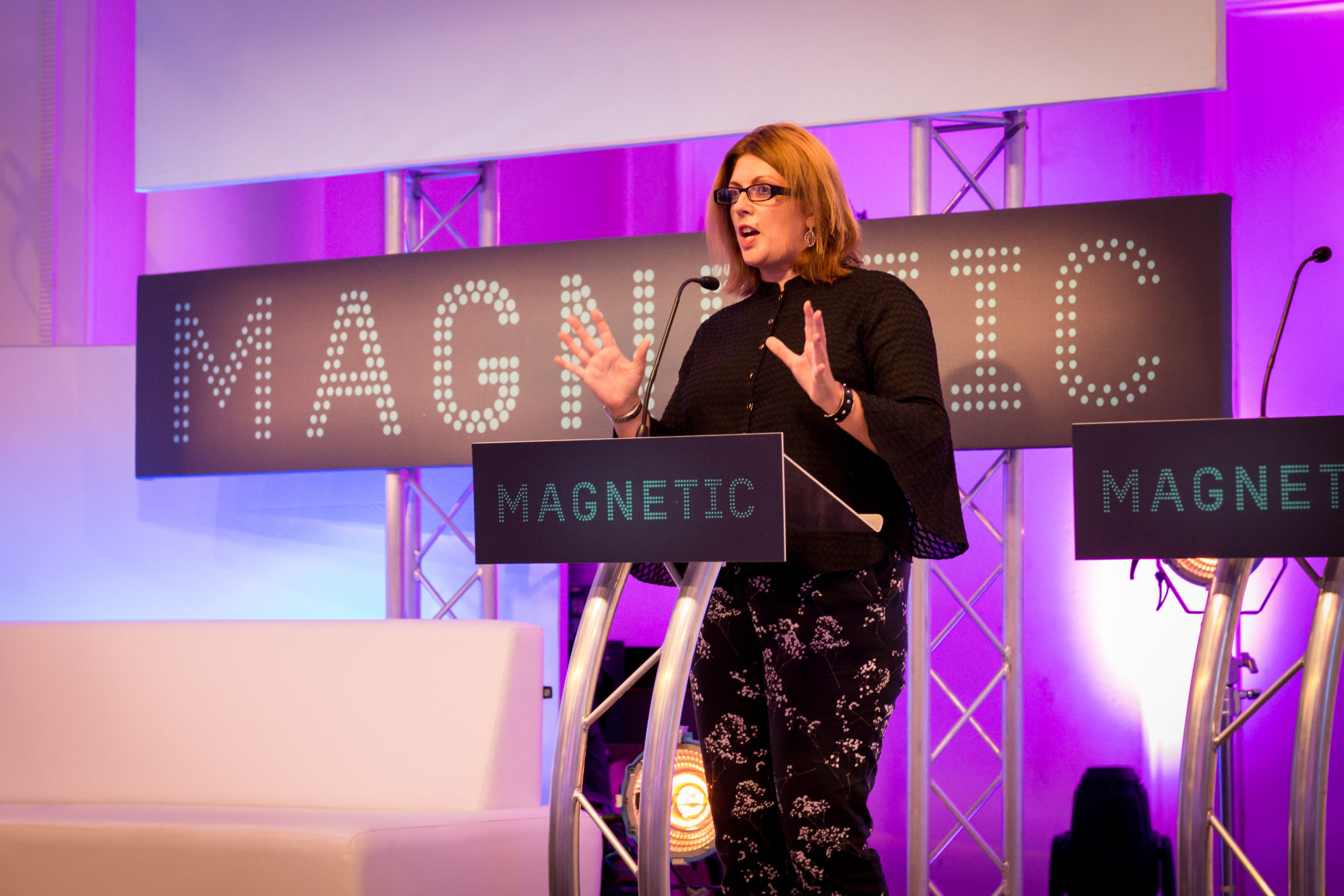
The opening and closing keynote sessions focused on business transformation, providing insight and stories on the lessons learned. Trust, which has escalated into a crisis on a global level in terms of fake news and brand safety, formed the basis of a new research initiative presented at Spark, alongside further discussion and analysis of the theme.
Spark#1 Digital Disruption & The Evolution of Publishing
Lindsay Pattison, who recently added the title of Chief Transformation Officer, Group M, to her responsibilities as global CEO of media network Maxus, interviewed Tom Bureau, the chief executive of Immediate Media, and Mark Frith, the new editorial director of Immediate’s Radio Times, about the challenges and rewards of business transformation.
The background to the session was a successful journey for Immediate Media since it was created in 2011, following the acquisition of BBC Magazines by private equity investment, and its subsequent purchase by Hubert Burda Media.
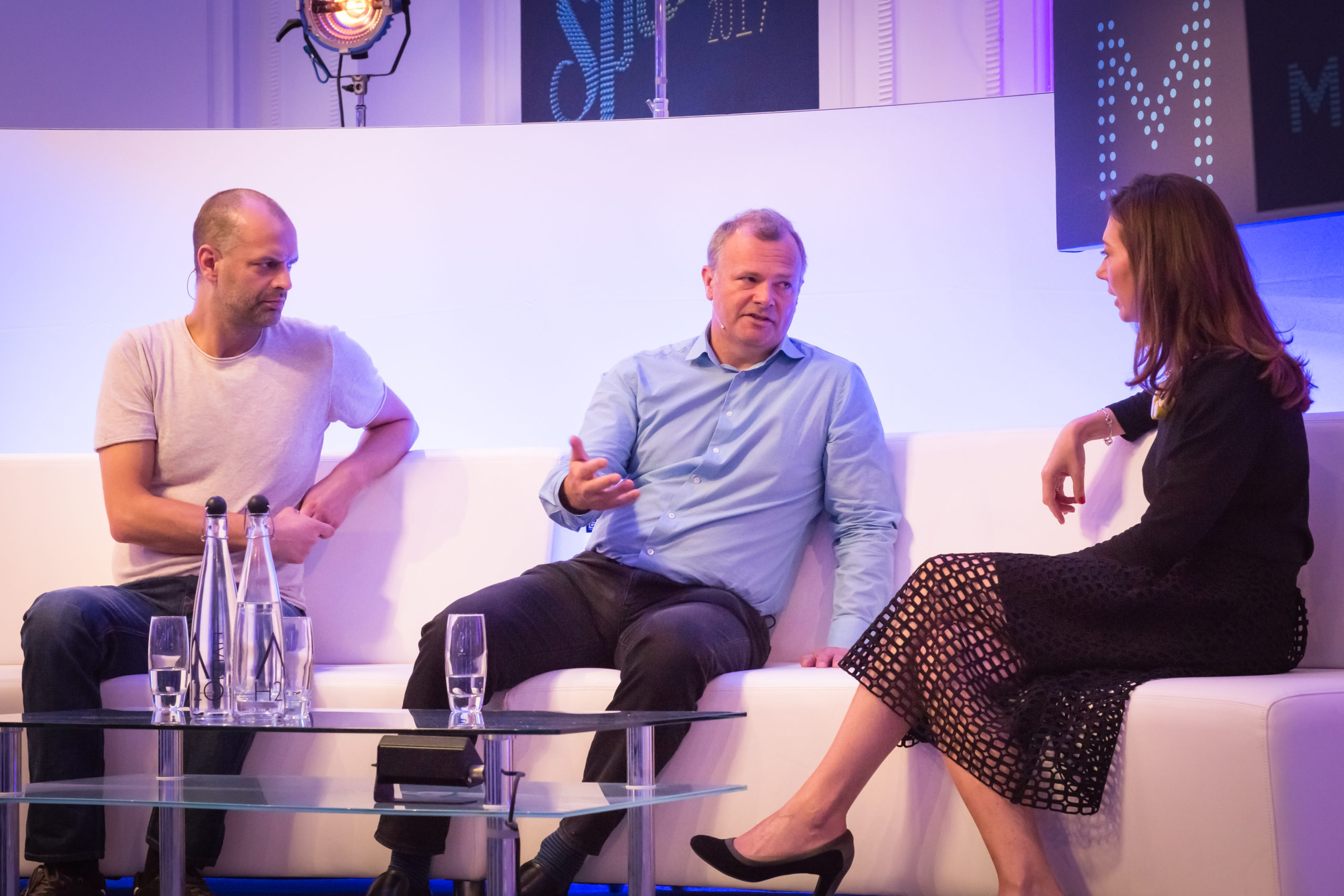
Tom Bureau: “We started with a solid, static, magazine business, went on a journey of investment and transformation, and we’re now twice as big, with twice as many staff. We still love magazines but in many more platforms. The vision before the deal was to be the specialist interest content company, only investing around people’s passions. Beyond a good strategy, transformation has been about two elements: culture and people, and investment in technology. “
“Magazines in TV listings, children’s, and current affairs, are all in robust health and growing. Our business in print has grown, in the right sectors, due to strong brands and brilliant people. But we take time to understand our incredible relationships with consumers, and then there are lots of investment opportunities.”
“We look for scale markets, there’s no point looking for niche. Cycling is a scaled market, craft is much bigger. But the opportunity of selling craft content is relatively small, around £60m and we have half of it. That’s alright but then the transactional opportunity in craft is massive, it’s £5bn. So we’ve acquired companies to drive people into transactions, through TV and social networking. We’re driving value from a very large market. “
“Really what we are is a consumer-facing business. We sell either content or, increasingly, invest in transactions – marketplace, TV shopping, and digital. This provides a very interesting platform for advertisers because we’re obsessed with deep engagement with consumers.”
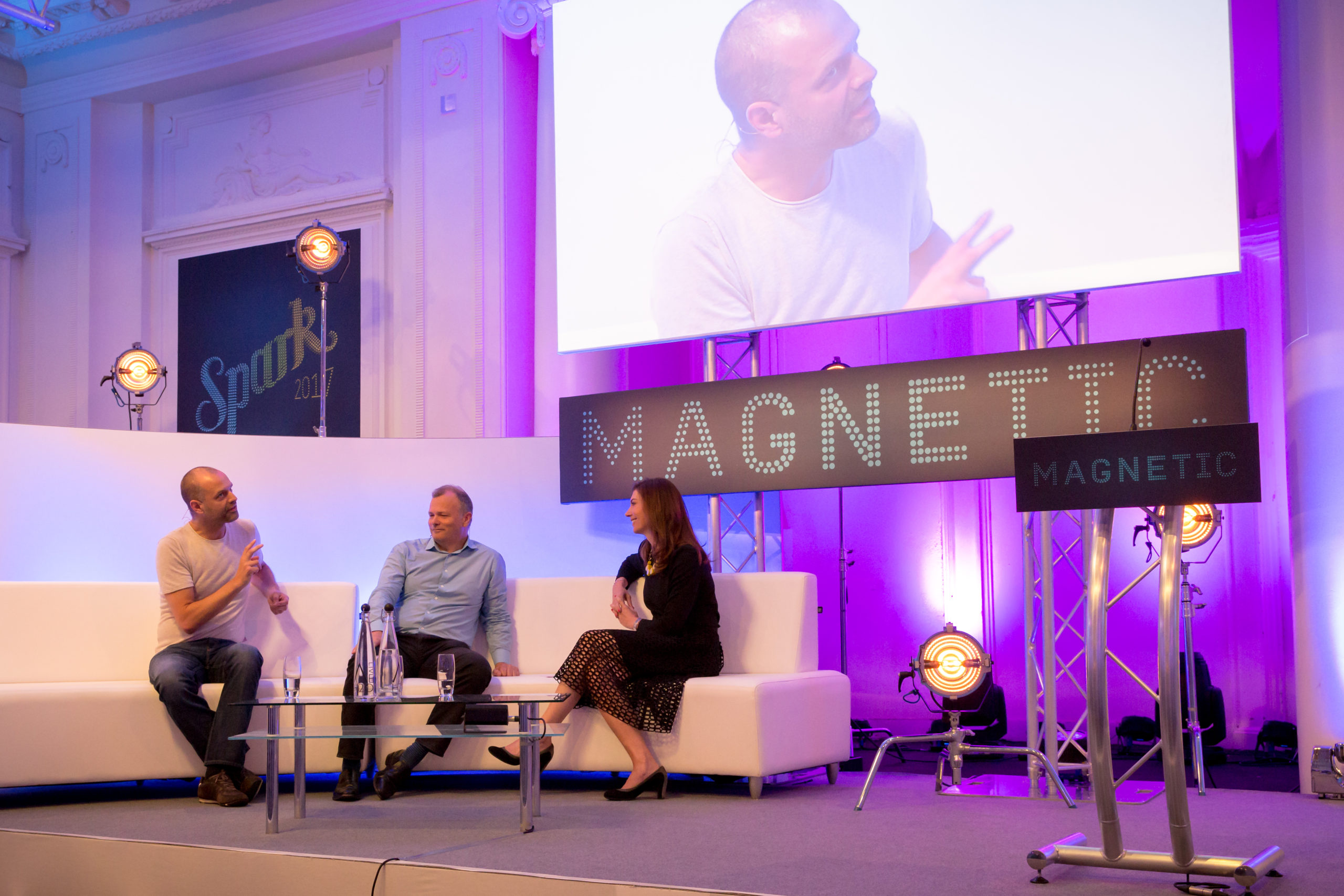
Mark Frith: “I heard about Immediate’s passion for content and they came from a slightly different world, of asking ‘why can’t we do it like this?’ We want to be in a position where to get to the TV and radio, people have to go through Radio Times. It’s a lofty aim but we want to own a market as much as possible, and you have to take the point of view of how to be in the position where people need you to get to that world, they have to go to the brand, and its iterations wherever they turn.”
Spark#2 Is Trust Contagious? The theme of the event then shifted to trust. Sue Todd introduced the next session with insight from PR network Edelman that showed consumer trust for companies and all institutions is at an all-time low. In this context, Ian Leslie, the consultant and author of books including Born Liars, tackled the issue of how environments and communities influence trust.

Opening with the observation that “brands and the environments that they are in is under-studied”, Leslie said that trust is a function of environment and is potentially impacted more significantly by where we are and who we’re with than by who we are.
He pointed out that our levels of trust are not universal and that culture and society are big factors. Trust also exists in a feedback loop where environment and context determine the degree to which we trust people. Leslie then compared “high context” versus “low context” cultures and methods of communication. High context relating to high levels of implicit expression and emotional and sensitive understanding of relationships. This contrasts to low context, which involves more explicit expression, and a “cards on the table”, shallower approach indicative of lower levels of trust.
This also related to the media environment, said Leslie: “Face-to-face is the ultimate high context environment, providing rich information from expressions. Low context tends to be more confrontational, less based on relationships, and more likely to result in rows. We all have to work a lot harder as people and brands to build and nurture trust because it’s harder in low context environments.”
Spark #3 A Matter of Trust
Spark continued on the trust theme, Magnetic unveiling its new ‘A Matter of Trust’ research, conducted in association with MediaCom, which explores the brand rub effect between advertiser and media environment.
Sue Todd introduced the session, asking what the trust crisis means for marketing, media, and brands: “Despite macro changes, surveys say there is an incredibly strong link between how trusted a brand is and other important KPIs.”
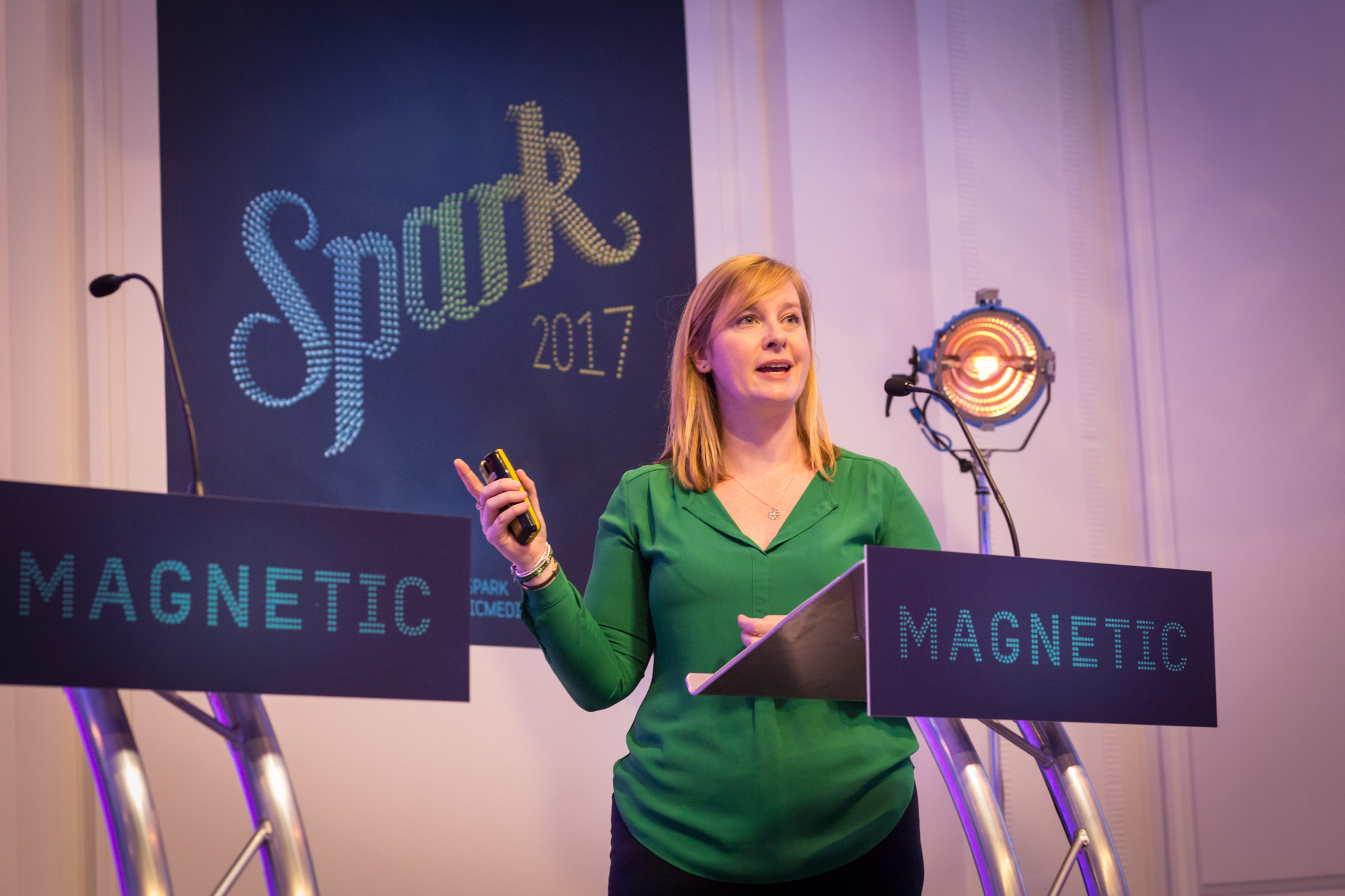
Ffion Turner, the business science director at MediaCom, then took to the stage to talk through the findings of the new insight study. It focuses on the differences in trust levels that both planners and consumers have towards magazines and social media.
The key findings include:
- Trust is in decline but the number of brands focusing on it in briefs is increasing. However, this is often articulated, according to agency planners, with associated words such as “credible”, “authentic”, “experts”, and “heritage” more than the trust itself. And planners default to TV and social media to answer these trust-related briefs.
- In terms of explicit perceptions, magazines media is more trusted by people than social media – 70% trusting magazines, 30% social media. Among people under 35, it’s a similar pattern, albeit with social media being more trusted – 65% to 35% in favour of magazine media.
- Magnetic and MediaCom also set-out to quantify a “t-score”, a more nuanced assessment of the constituents of trust. Magazine media scores highly on key measures including reliability and ethics, meaning and experience.
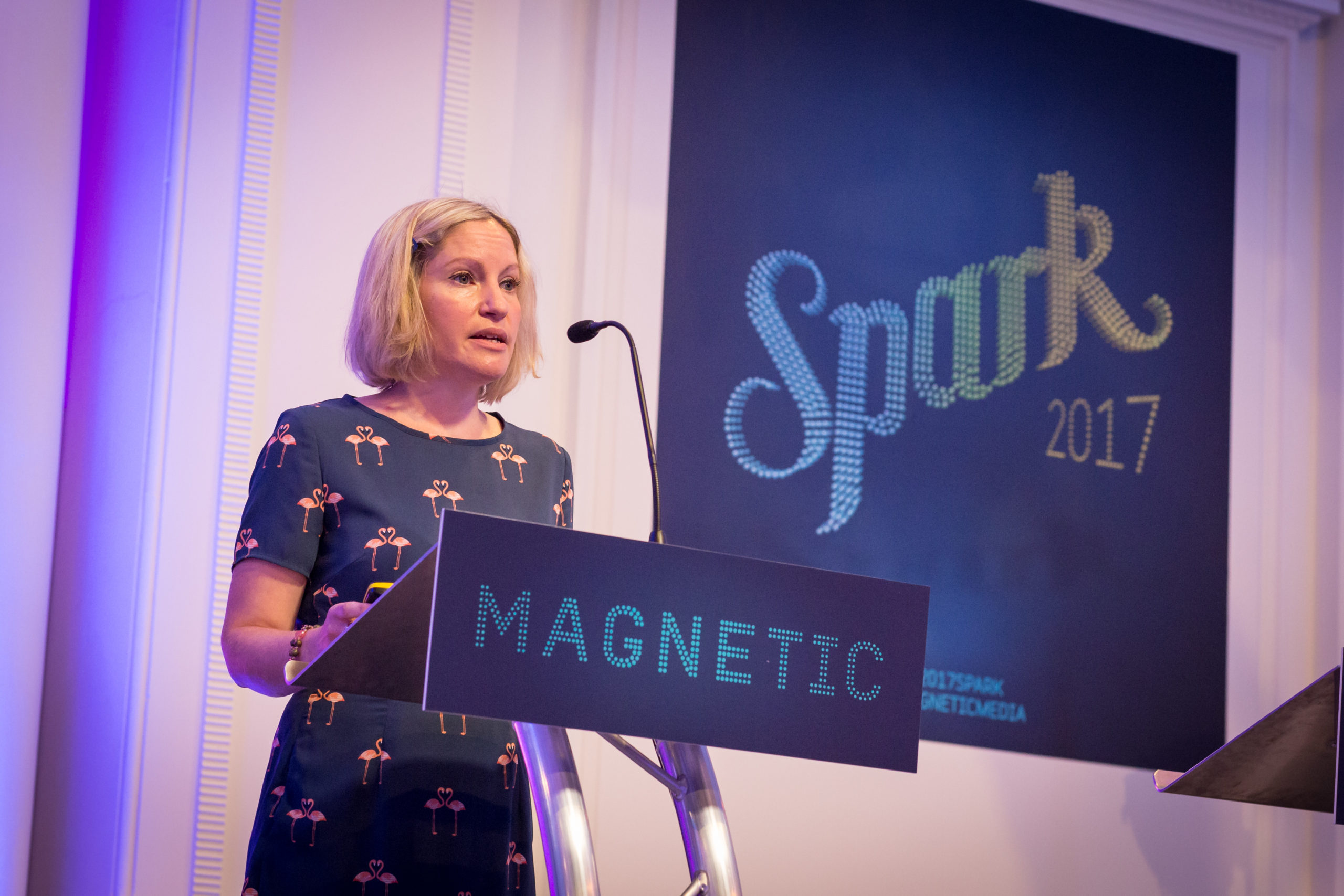
Anna Sampson, Magnetic’s head of insight, then focused on trust and “the rub effect” – could the research prove that advertisers which partner with magazine brands benefit from perceptions of trustworthiness?
The findings include:
- Magazine brands deliver significant rub effect on perception of trust. Ranging from 64% to 94% across brands including Tesco, Pearl Drops, and ghd.
- This increase can be delivered through display, print, online, even social activity. It’s about the magazine brand not the platform.
- Combining magazines and social media enhanced that rub effect.
Spark #4 Navigating Trust in a Post-Truth Era
Gideon Spanier, Campaign’s head of media, was the moderator for a panel discussion that debated the findings of the Magnetic/MediaCom ‘A Matter of Trust’ research. He was joined on stage by Robert Ffitch, chief strategy officer, Hearst; Lucie Cave, editorial director, commercial partnerships, Bauer; Becky Hardman, advertising campaign manager at Very.co.uk; and Chris Broadbent, chief operating officer, MediaCom North.
Spanier and the panel explored themes including magazine media outscoring social media on trust metrics, brand safety and the value of context, and the issue of short-termism in marketing. On magazines as trusted brand partners:
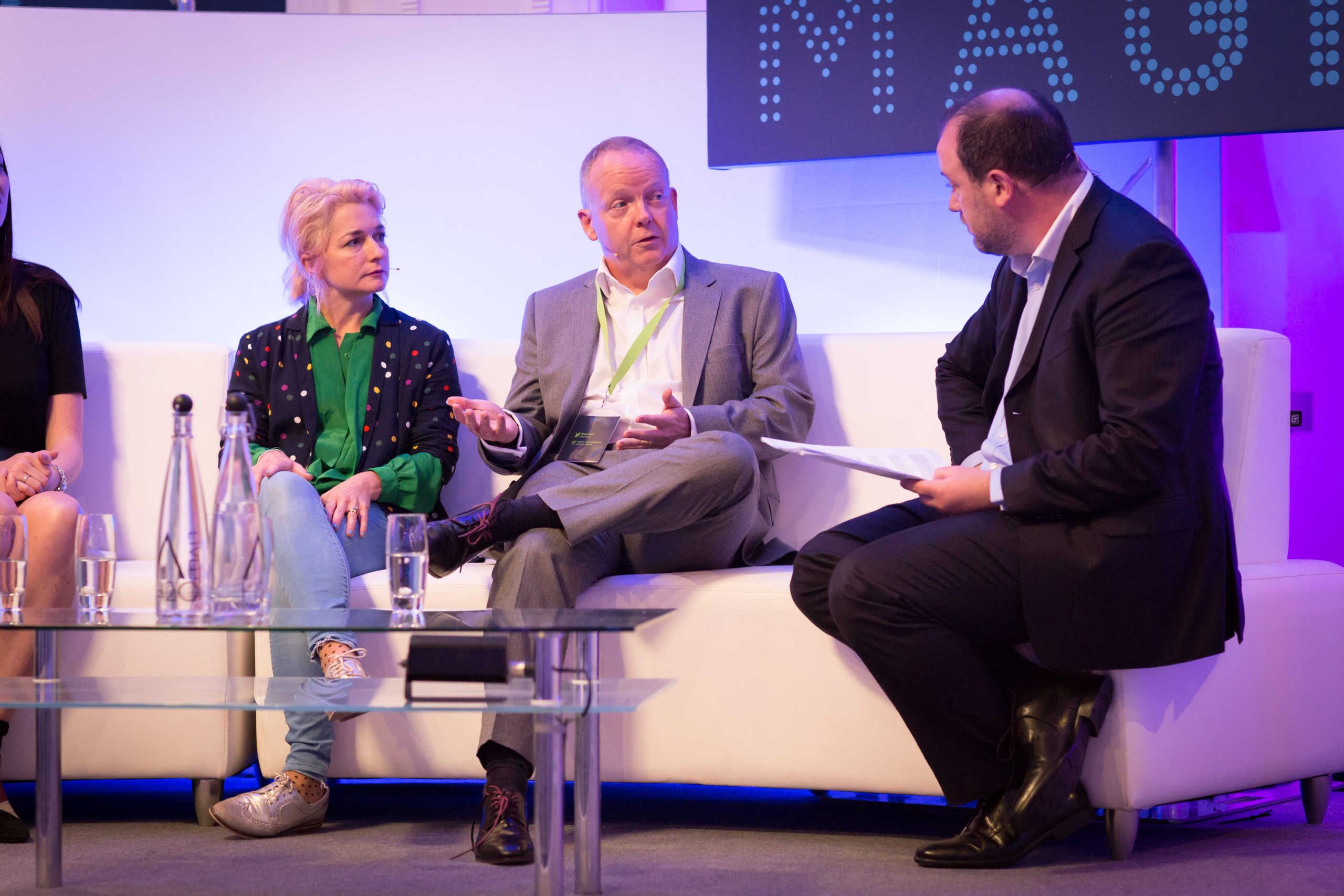
Robert Ffitch: “When children play football they follow it everywhere, some marketers have a tendency to do the same and follow the shiny and the new. Innovation drives real interest, which is good but takes people away from traditional media.
What magazines do is offer a relationship in a moment in time that no other media can deliver. That trusted time is unique in the craziness of the world we live in.”
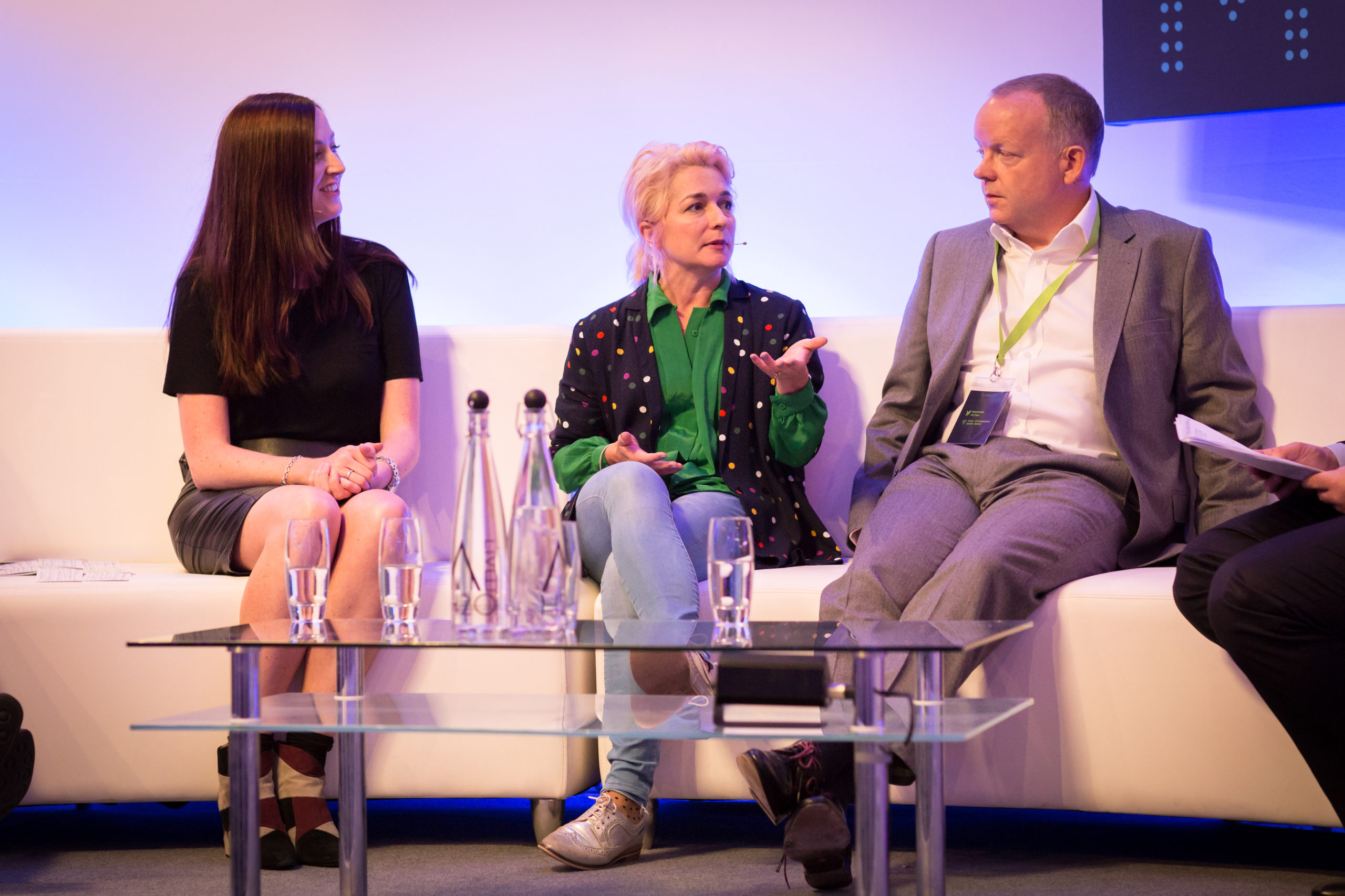
Lucie Cave: “Our work with Shop Direct shows relevancy embedded in our print brands, and their authority, together with social media. For us, it’s about looking at what magazine brands and ambassadors do for that audience and then how we can experiment with, and play with, other channels.
But it’s important that the brand you work with has a fit with your editorial brands. The editorial team are guardians of a brand, and we’d never agree for Grazia’s shopping editor or style editor to be part of a campaign unless it’s right.”
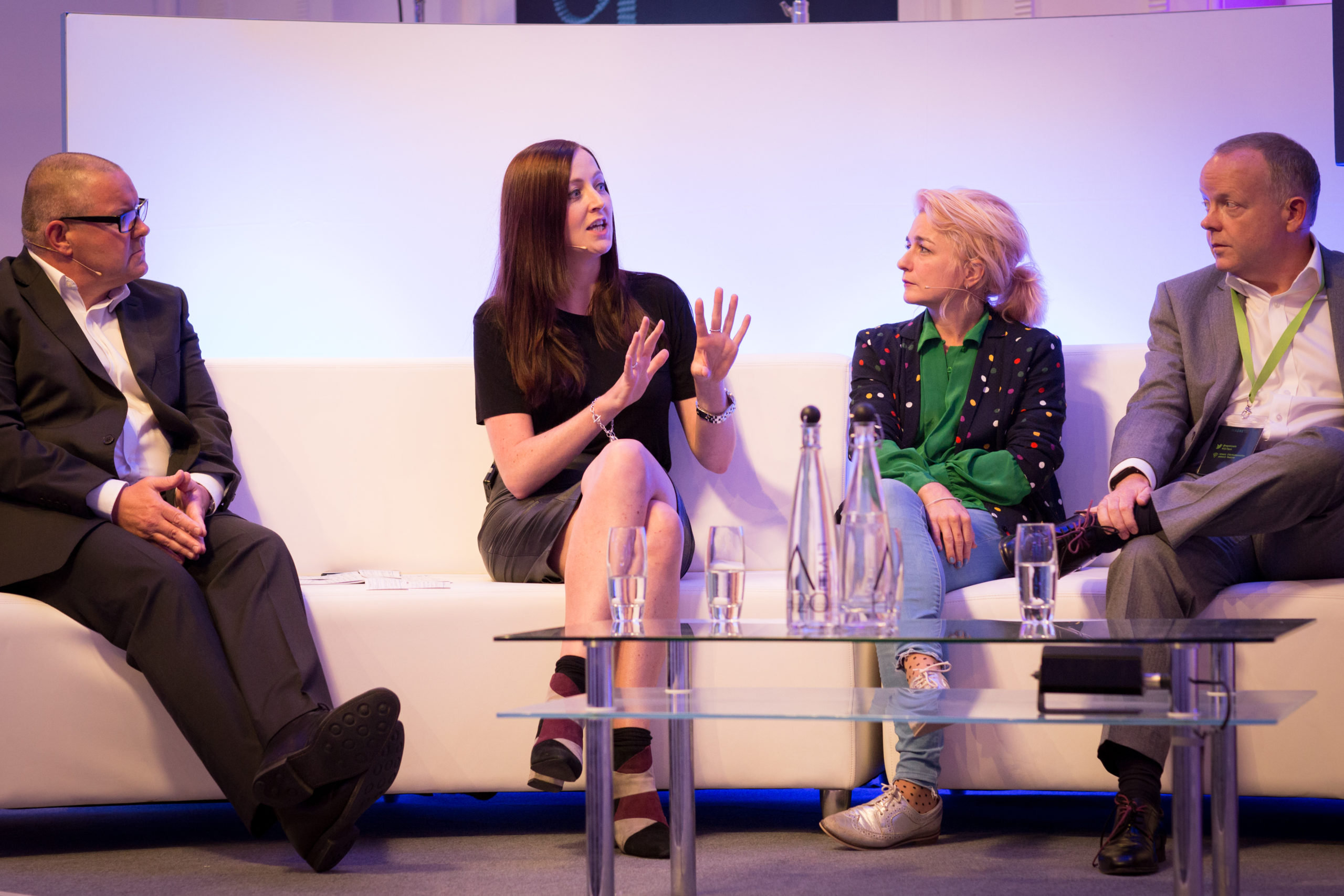
Becky Hardman: “[The research results are] not surprising, Shop Direct is keen to track results, and we’ve known for a long time that magazines and magazine brand partnerships deliver against trust metrics.
As important as the targeted nature of social media is, working with a magazine brand brings social media together with trusted print products.”
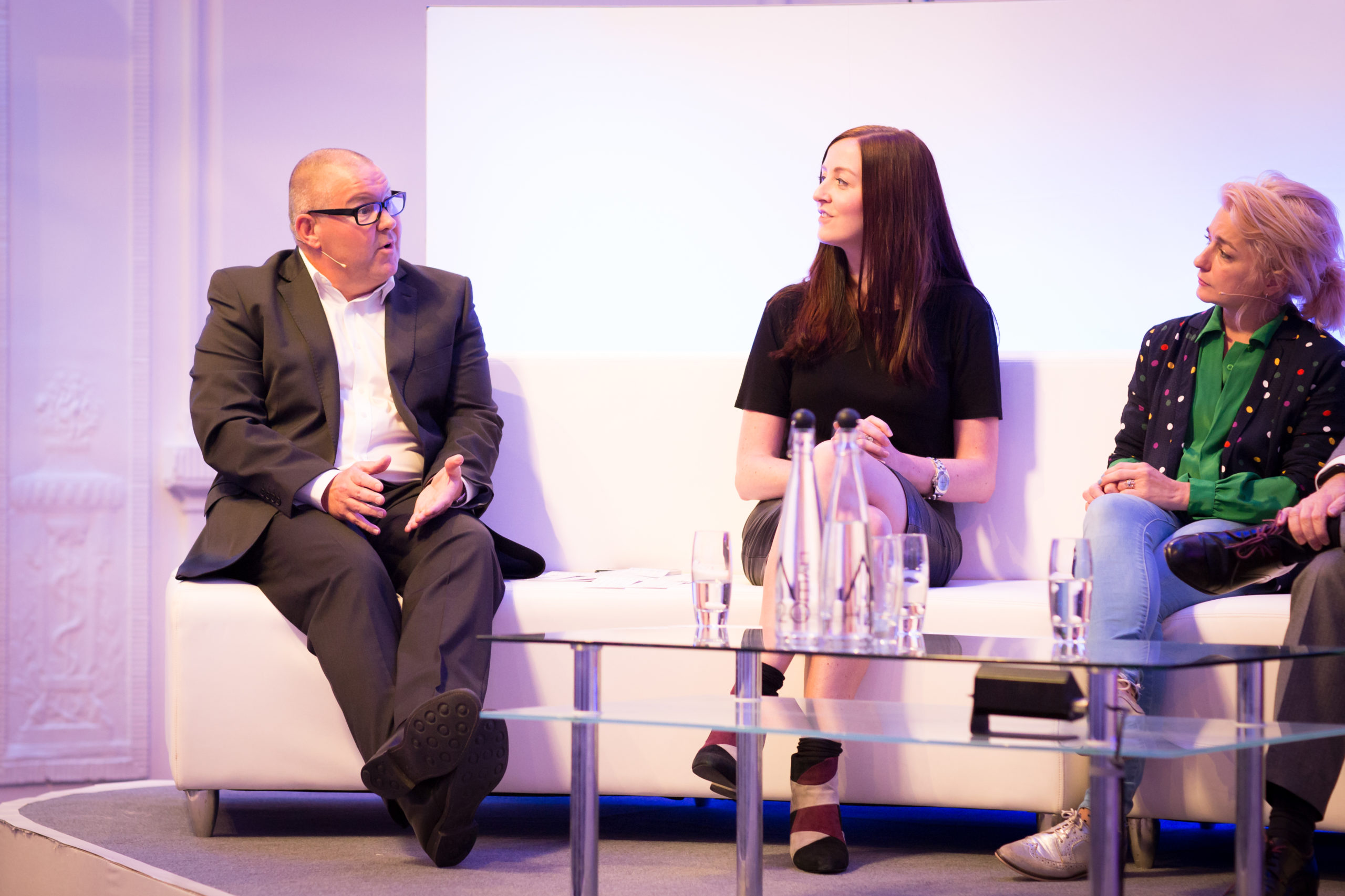
Chris Broadbent: “Planners and other agency people should be thinking about the business benefits and wider partnerships and not just about print – magazines have growing mobile and other facets.
We should be making more use of magazines but in a different way. There is the push towards shiny things which bring pressure but there are lots of opportunities if magazines can show what they have as a USP.”
On brand trust:
Robert Ffitch: “The digital ecosystem around the world is fundamentally corrupt and fraudulent, yet 65% of media money is spent in the digital environment. Some 34% is spent with Facebook and Google, and this pair are still riddled with issues. It’s great that P&G and Unilever are coming out with strategic frameworks to address this. Trusted brands with real audiences and human experiences should benefit but we’re not seeing this yet as so much inventory is bought programmatically and content is too often secondary. We will get there but there is not enough evidence to see it’s turning yet.”
Spark#5 Brand Building in a Digital Age
The event concluded with a return to the theme of transformation with a keynote from Jon Goldstone, the former Unilever, Premier Foods, and PepsiCo marketer, who is now the global managing partner at consultancy The Brand Gym.
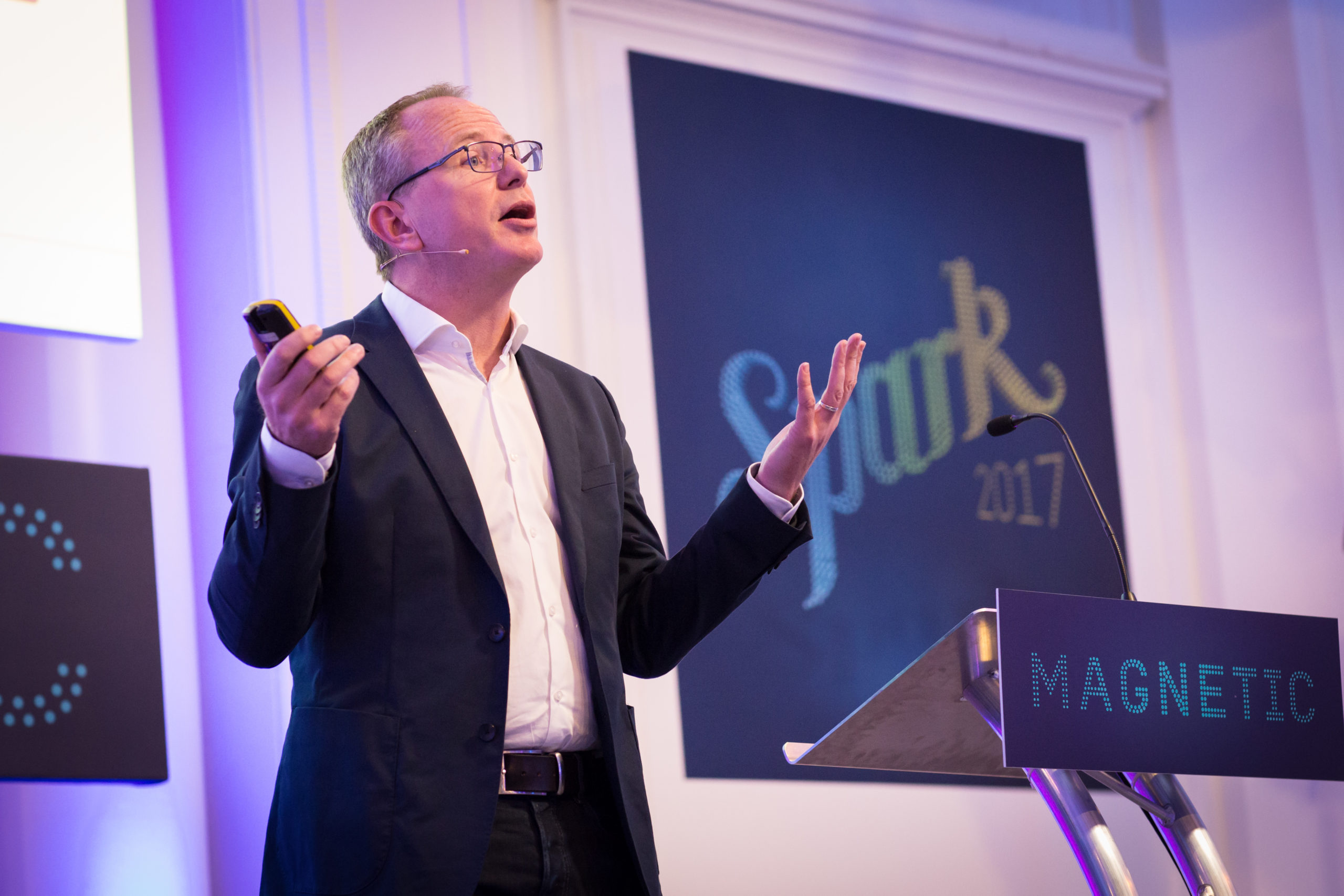
Goldstone spoke about the significant disruption faced by the traditional Consumer Packaged Goods (CPG) companies. He identified three reasons
- Massive consumer disruption in the shape of a move to supposed healthier and craft alternatives.
- A squeeze from the major grocers responding to pressurised customers with price cuts.
- Lower return on investment.
And the new digital media economy is not helping to improve this ROI. Goldstone said: “With the duopoly of Facebook and Google, nobody knows if they are getting ROI. It’s like throwing your money into a wishing well and hoping something will happen.”
With CPG’s struggling for growth and facing declining margins, the private equity companies are circling. So is this leading to marketers looking to be
“super-strategic and visionary”?
Not according to The Brand Gym’s research. It asked 100 UK marketers if brand strategy is being overlooked. Some 62 per cent agreed. And when asked for their key driver to use social media, 62 per cent said, “to keep up with latest trends”. Just 23 per cent identified “tangible business impact”.
Goldstone identified “the doom loop” and the danger that CPG brands are entering an inexorable cycle of lower investment, poor brand health, and sales decline. The good news is that media brands can help by providing three assets:
Authority: “Nobody searches online for brands like Flora. Ten out of ten will go for BBC Good Foodwhen looking for a recipe. That’s the power of your brands. Of the incredibly powerful equity and trust that many consumer brands don’t have.”
Ideas: “I’m not talking about little tactical ideas but really big strategic ideas.”
Data: “Show me the money. When I see metrics – where’s the sales impact? How many more packs did you sell as a result of this activity? Unless you can prove your activity sells more stuff then the brand won’t return. It’s hard to understand the sales effect with CPG brands because the shopper journey is complicated, but until you figure this out you’re not going to convince the accountants to invest in your media.”
Sue Todd rounded off the event with two charts to show how magazine media is getting to grips with the needs of brands in a transforming world. The first demonstrated that magazine media is now more effective than previously: “The IPA databank shows we’re becoming more effective not less, probably because of the integrated nature of our channels and that we’re working harder on proof points.”
The second slide looked forward to a new, more robust audience system for magazine media via PAMCo and AMP – “offering robust, multi-platform, de-duplicated data to help plan multi-channel campaigns in a much more effective way.”
To view all of the pictures from Spark 2017 please check our event gallery.


